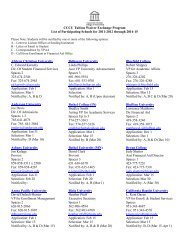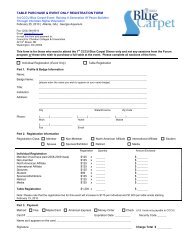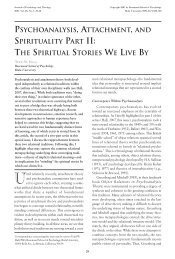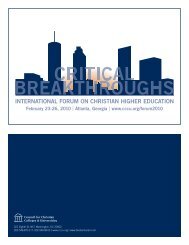Market Research Findings February 2010 - Council for Christian ...
Market Research Findings February 2010 - Council for Christian ...
Market Research Findings February 2010 - Council for Christian ...
- No tags were found...
You also want an ePaper? Increase the reach of your titles
YUMPU automatically turns print PDFs into web optimized ePapers that Google loves.
<strong>Market</strong> <strong>Research</strong> <strong>Findings</strong><strong>February</strong> <strong>2010</strong>Kevin Crockett, President/CEO and PrincipalRuth Sims, Senior Vice president and Principal
CCCU’s higher education marketplace isextremely competitive
Projected change in number of highschool graduates, 2009-10 to 2019-20Percent changeby stateSource: Western Interstate Commission <strong>for</strong> Higher Education© Copyright 2009, The Chronicle of Higher Education.Reprinted with permission. This material may not be posted,published, or distributed without permission from The Chronicle.
How can we meet our mission?To advance the cause of Christ-centered highereducation and to help our institutions trans<strong>for</strong>mlives by faithfully relating scholarship and serviceto biblical truth.
How do we market and recruit <strong>for</strong>CCCU institutions in this environment?
<strong>Research</strong> goals• How have college choice factors changedsince 2000?• How are <strong>Christian</strong> colleges anduniversities viewed?• What CCCU member strengths canbe validated through research?• What are the greatest opportunities toimprove recruitment effectiveness?
Finding the right market positionMARKET DEMAND:Establish what studentswantCOMPETITION: Identify anunduplicated marketpositionCCCUPositioningPRODUCT: Verify whatCCCU schools do best
CCCU 2008 <strong>Research</strong> Components1. Undergraduate inquirers2. Parents of inquirers3. Non-inquirers4. Accepted matriculantsand non-matriculants5. Prospective transferstudents6. Current undergraduates7. Young alumni8. Guidance counselors9. Faculty and staff10.Parents of young alumni11.Church leaders12.Academic programdemand13.Competition analysis14.Predictive modelsprospect/inquiry/enrolled
Should CCCUschools be marketoriented ormission driven?
The market research revealed fourbroad themes1 2 3 4
Finding1What the marketwants from acollege educationis . . .
Four decision factors dominateRegardless of the funnel stage:• The quality of the academic program ormajor a student is interested in• Preparation <strong>for</strong> future careers• Faculty who are excellent teachers• Faculty who are well qualified in their fieldsof study
Of 17 college choice factors . . .“Quality of the academic programyou are interested in” received thehighest ratings by bothmatriculants and non-matriculants.Career preparation and quality ofmajor increased significantly inimportance over the 2000 CCCUmatriculant study.
Every major has a story
The <strong>Christian</strong> factorsAs students move through the funnel stages,importance increases <strong>for</strong>:<strong>Christian</strong> life and communityIntegration of the <strong>Christian</strong> faith and learning<strong>Christian</strong> facultyFaith commitment of fellow students
What’s most important?2000 Matriculants 2009 Matriculants1 Integration of<strong>Christian</strong> faith andlearningQuality of academicprogram you areinterested in2 <strong>Christian</strong> atmosphere Preparation <strong>for</strong> futurecareers3 Value of education Faculty who areexcellent teachers4 Fellowship with other<strong>Christian</strong>sFaculty who are wellqualified in their fields5 <strong>Christian</strong> faculty Availability of financialaid/scholarships
The face of America’s youth“ . . . Adolescents seem to be shifting awayfrom conventional religious beliefs.”─ National Study of Youth and Religion, 2008
How often do you attend church services?Matriculants2000Matriculants2009More than once a 54% 41%weekAbout once a week 41% 46%Once or twice a month 4% 8%A few times a year 1% 4%Never 0% 1%
The challenge“. . . you can find a <strong>Christian</strong> environment ata public college. Whether a college oruniversity is a <strong>Christian</strong> school is notimportant to me. If I went to a publicuniversity I would plan on attending a<strong>Christian</strong> student center and spend timewith other <strong>Christian</strong>s.”─ Non-Matriculant who chose a four-year privatecollege or university, <strong>Christian</strong>, Male,White/Caucasian
Non-matriculants: What’s important?2000 Non-MatriculantsPreparation <strong>for</strong> futurecareersAvailability of financialaid/scholarshipsQuality of academicprogram you areinterested in2009 Non-MatriculantsAvailability of financialaid/scholarshipsQuality of academicprogram you areinterested inPreparation <strong>for</strong> futurecareers
Evaluating academic facilitiesNon-matriculants tendto consider quality ofacademic facilities aspart of the totalacademic package,while the matriculantsdo not
Teaching ability, credentials – then faithWhile faculty members are key,specifically <strong>Christian</strong> facultyranked last of the 17 itemsinquiries and their parents wereasked to rate.
Which statement most closely reflectsyour beliefs?Most <strong>Christian</strong> collegesand universities offer thesame quality of academicinstruction as stateuniversities<strong>Christian</strong> colleges anduniversities tend to haveweaker academics thanstate universitiesMatriculants Nonmatriculants91% 88%9% 12%
The cost factorand marketexpectations
On the whole, <strong>for</strong>inquiring students andtheir parents theexpected differentialbetween the price of a<strong>Christian</strong> college and astate university isroughly $5,000 to$8,000Price sensitivity
Price sensitivity implicationsFor each $5,000increment in tuition,students and parentsexpect about $2,000additional in financialaid in order to af<strong>for</strong>dthe institution
Pricing Example<strong>Christian</strong> college tuition $25,000State school tuition $ 8,000Price differential $17,000Acceptable or expected pricedifferentialGap to be made up throughsignificantly enhancedmarketing or financial aid award$ 5,000 - 8,000$ 9,000 - 12,000
What isCCCU’scompetitivecontext?
Where did they go?Lost admitted CCCU students:• 38% another privatecollege/university• 38% four-year public• 21% community college• 3% other
Competition within CCCUCCCUSchoolsAll OtherOnly 6% of lost admits went to a competing CCCUinstitution
CCCU schools serve all income levelsYield Rates by Income Level70%60%50%40%30%20%10%0%Under $15K$15K to
Losing diversity to the competitorsMatriculantsNon-matriculantsAlaskan Native orAmerican Indian
Finding2We must speakto each audiencein its ownlanguage
Either/or
Statement of faith required or optional?31% 69%
Visitation or no visitation hours inresidence halls?82% 18%
College has student lifestyle regulations . . .Or not?58%42%
What do parents want?• Quality of the academicprogram a student isinterested in• Faculty who are excellentteachers and are wellqualified in their fields• Graduates get good jobs• Quality of academicfacilities
Parental influenceParents in a household where one or bothparents attended a <strong>Christian</strong> college arenot necessarily rating <strong>Christian</strong> institutionsmore highly on the things that matter mostto them.
Guidance counselors’ top threeTop criteria <strong>for</strong> recommending a school:(1) academic quality, (2) outcomes, and (3) cost.Cost ranked higher in importance <strong>for</strong> guidancecounselors than <strong>for</strong> parents of inquiries.
Communicating with the gatekeepersKeeping guidancecounselors in<strong>for</strong>medabout financial aid andscholarships at CCCUschools is critical toprevent “filtering out” bycounselors of studentsthey decide can notaf<strong>for</strong>d a private college oruniversity.
The most important considerations <strong>for</strong>transfer students are . . .. . . quality of intendedmajor, faculty teachingabilities and credentials,and career preparation.The factors that define aspecifically <strong>Christian</strong>environment are lessimportant to transferstudents than to othersurvey populations
Transfer student expectationsEnrollment officers and academic staff must worktogether to ensure flexibility in transfer studentrequirements and credit acceptance.A rigid approach that expects transfer students tosignificantly lengthen their course of studies tomeet graduation requirements will not supportenrollment growth.
The transfer marketRoughly 10 percent of the CCCU inquirypool indicates a first-choice preference <strong>for</strong>community colleges, demonstrating theneed to keep in touch with this group aspotential transfer students if they do notimmediately enroll at a CCCU school.
Finding3Students, alumni,faculty, staff andadministratorspoint to CCCUstrengths
The research populationsCurrent studentsFaculty, staff, and administratorsYoung alumni (past 10 years)Parents of young alumni
Satisfaction surveying is an importantcomponent of marketing CCCU• Strengths we canpromote with integrity• Institutional weaknesseswe must address tosupport recruitment andretention
Students identified CCCU’s top strengths1. The content of the courses withinmy major is valuable2. The instruction in my major field isexcellent3. Nearly all of the faculty areknowledgeable in their field
Powerful synergy!Of top importance toCCCU inquiries1. Quality of the academicprogram you are interestedin2. Faculty who are excellentteachers3. Faculty who are wellqualified in their fields ofstudyHighly rated by CCCUstudents1. The content of thecourses within my majoris valuable2. The instruction in mymajor field is excellent3. Nearly all of the facultyare knowledgeable intheir field
Institutional Priorities Survey strengthsStrengths identified byfaculty/staff/administrators:1.Faculty care about studentsas individuals2.Nearly all of the faculty areknowledgeable in their field3.The campus is safe andsecure <strong>for</strong> all students4.Students are able toexperience intellectual growthhere5.The campus staff are caringand helpful
A notable difference of opinion“Tuition paid is a worthwhile investment”For students a “challenge”For faculty, staff, administrators a strength
In terms of currentstudent satisfaction,non-white students ratedtheir satisfaction withtheir overall experiencelower than whitestudents and were lesslikely to indicate thatthey would make thesame choice again.Diversity issues
CCCU has a great “first choice” rankingwas my . . .1st choice 71.6%2nd choice 20.1%3rd choice or lower 8.4%
The ultimate questionOverallsatisfaction?Would you do itagain?CCCUStudentsNat’l norm:4-yr privateCCCU20075.7 5.2 5.65.8 5.2 5.67-point scale, 7 = very satisfied , definitely yes
CCCU’s youngalumni speakabout theirexperiences
Spheres of CCCU alumni influenceEducation 38%Health care 13%Ministry/Church/Religious organization 11%Finance or insurance 7%Arts, entertainment or recreation 4%In<strong>for</strong>mation technology 4%Manufacturing 4%Scientific or technical services 4%Social assistance 4%
What CCCU alumni value mostCCCU alumni regardstudying theiracademic major in thecontext of the<strong>Christian</strong> faith andbeing able to connectfaith to learning andlife as the top reasons<strong>for</strong> attending a<strong>Christian</strong> college
What skills were most enhanced?I am able to write clearly and concisely.(88%)I have been provided with a foundation andcapacity <strong>for</strong> lifelong learning. (89%)I have no problems presenting my workorally. (84%)I can and do articulate a <strong>Christian</strong> worldviewin my community. (80%)
What skills were least enhanced?I can identify pertinent scientific principleswhen presented with an issue. (52%)I have sufficient math skills to function wellin my chosen profession and daily life.(55%)I feel com<strong>for</strong>table reading technical and/orstrategic documents. (62%)I can understand debates about technicalissues, such as the environment, orcomputers. (64%)
Would you recommend your college?. . . to your own son/daughter?AnswerResponseVery likely 18%Likely 47%Somewhat likely 14%Neutral 8%Somewhat unlikely 4%Unlikely/Not at all likely 9%
Qualitative alumni commentsAlumni frequently expressed a wish that<strong>Christian</strong> colleges were more representativeof the diverse world they enter aftergraduation.
Alumni on career servicesThe statement “Thecareer services officeat my undergraduateinstitution assisted mewith career planning/placement and jobsearch” received onlya 25% somewhat orvery satisfied rating
Overall CCCU alumni satisfactionis highAbout three in four indicated they are either“very satisfied” or “satisfied” with theiroverall education as well as the educationthey received in their major
Parents of young alumniMore than 80% of parents ofyoung alumni were satisfied withtheir child’s experience at a<strong>Christian</strong> college
Finding4<strong>Christian</strong>colleges anduniversities needgreater outreach
What do theythink about<strong>Christian</strong>colleges anduniversities?
Familiarity with <strong>Christian</strong> colleges22%35%27%30%CCCU Inquiries43%43%Not at all/slightlyfamiliarModeratelyfamiliarVery/Totallyfamiliar
Inquiries: How familiar are you with<strong>Christian</strong> colleges and universities?Type of high school attendedHomeschooledPrivate<strong>Christian</strong>PublicAll other(Catholic,Private/nonsectarian)40% 44% 20% 14%Percent saying very or totally familiar
Inquiries: How important is it to you toattend a <strong>Christian</strong> college or university?Type of high school attendedOnly<strong>Christian</strong><strong>Christian</strong>plusothertypesHomeschooledPrivate<strong>Christian</strong>Public32% 18% 10% 5%All other(Catholic,Private/nonsectarian)68% 81% 88% 95%
Do you intend to apply to a <strong>Christian</strong>college or university?Parent attended<strong>Christian</strong> college/universityYes 80% 58%No 12% 25%Don’t know 8% 17%Parent did notattend<strong>Christian</strong> college/university
Guidance counselors’ familiarity withCCCU schools7%22%Not at all/notvery familiarSomewhatfamiliarVery familiar71%
<strong>Christian</strong> colleges: share of mindSomewhat/very familiar:Guidance counselors* 29%Prospects 50%Inquiries 57%Parents of inquiries 61%Church leaders 94%*Specifically with CCCU
Who’smissing?
Non-inquiring prospects are viableAs identified by the Noel-Levitzpredictive model, the untapped marketpotential <strong>for</strong> CCCU schools is large.While 70% do not currently plan toattend a <strong>Christian</strong> college, two-thirdshave a sufficient level of interest in a<strong>Christian</strong> college or university toconsider them viable prospects <strong>for</strong>CCCU schools.
These prospects are “secret shopping”Although many are notvery familiar with<strong>Christian</strong> colleges anduniversities, two of everythree “prospects” hadvisited the Web site of a<strong>Christian</strong> college oruniversity
Compared withstudents who enroll atCCCU schools, theseprospects are lesslikely to preferconservativecharacteristics in acollege environment
Student search strategyFor schools doing astudent search program,the messages shouldemphasize careerpreparation, quality ofacademic programs,and well-qualifiedfaculty who are goodteachers
First-generationcollege studentsmake up nearly25% of the CCCUinquiry pool
First generation leanings• More likely than theoverall inquiry populationto be:HispanicCatholicDemocratsIncomes under $50K• More likely to rateparents as very influential• Less likely to have parenthelp with SAT/ACT prep•Late SAT/ACT takers• No friends or family whohave attended a<strong>Christian</strong> college• Rate “getting a goodjob” higher as expectedcollege outcome• Place higher value ondiversity
Outreach to church leaders47% of church leaders surveyed indicatedthat they are either moderately or veryinvolved in the college considerationprocess of their church members.A quarter said their churches includedcollege and career planning as part of theeducational curriculum.
One of the greatest paradoxesof human development is that we must makecrucial choices . . . be<strong>for</strong>e we have theknowledge, judgment and self understandingto choose wisely.- Daniel LevinsonLevinson, D. J. (1978). The seasons of a man's life. New York, NY: Random House Publishing (p 102).
The three big “take-aways”1. Top college choicefactors are tighteningto focus even moreheavily on academics2. CCCU members’documented strengthsalign well withmarketplace demand3. There is significantmarket potential <strong>for</strong>those who consistentlyinvest in extendedoutreach
Discussion


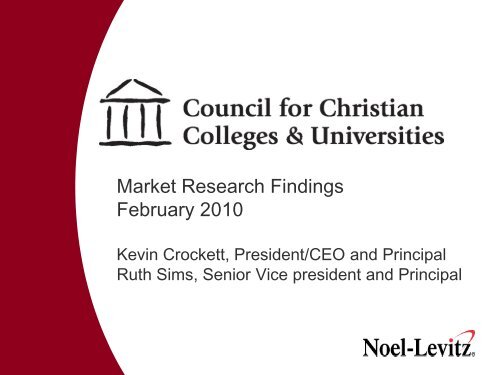
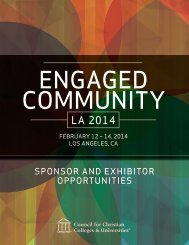
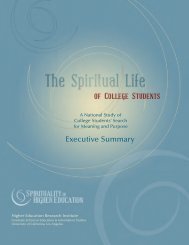
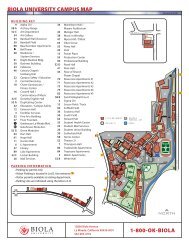

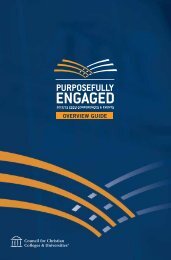

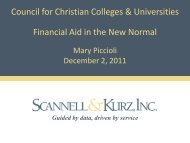
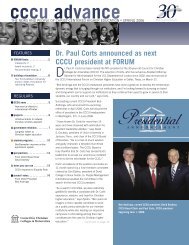
![Download Guide [PDF] - Council for Christian Colleges & Universities](https://img.yumpu.com/37211849/1/190x245/download-guide-pdf-council-for-christian-colleges-universities.jpg?quality=85)
